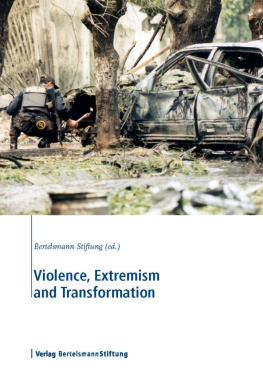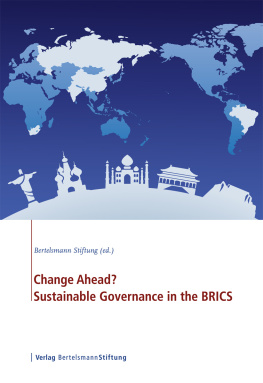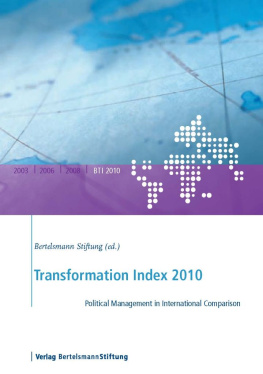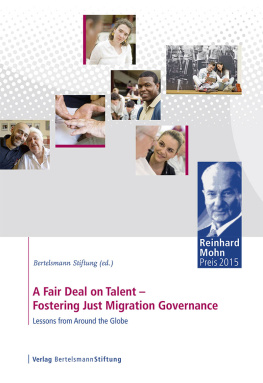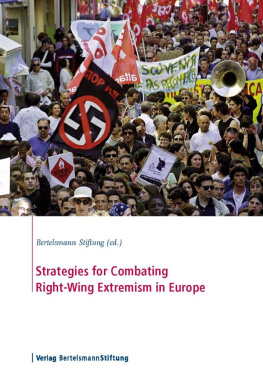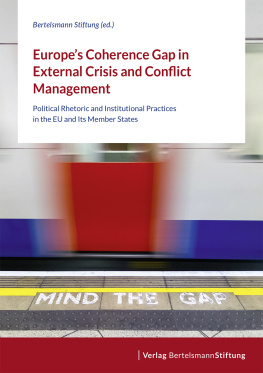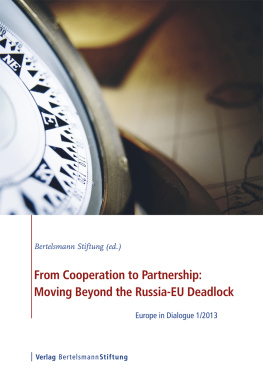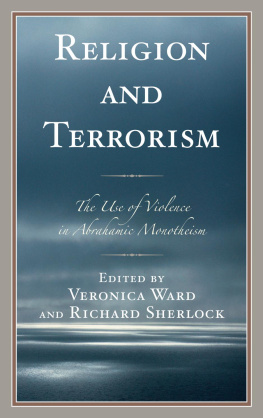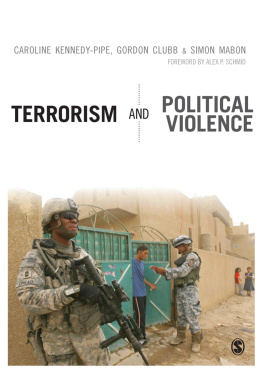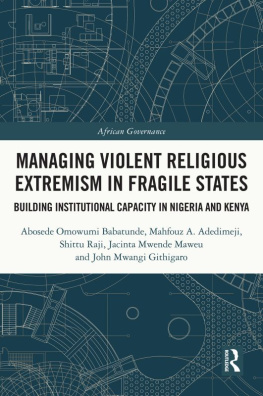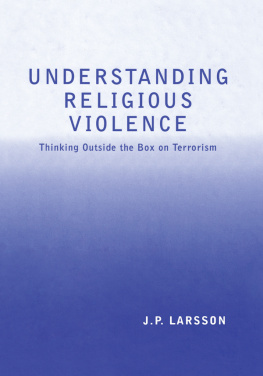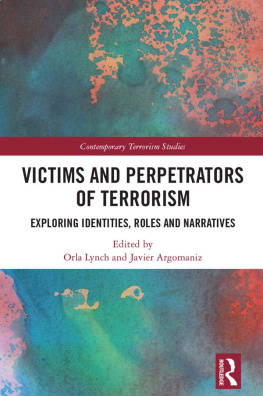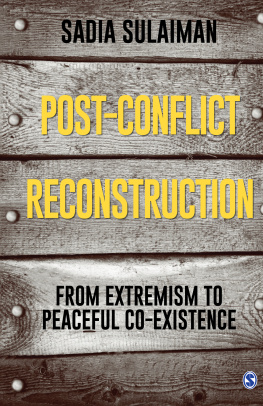Bibliographic information published by the Deutsche Nationalbibliothek
The Deutsche Nationalbibliothek lists this publication in the
Deutsche Nationalbibliografie; detailed bibliographic data
is available on the Internet at http://dnb.d-nb.de.
2010 E-Book-Ausgabe (EPUB) 2006 Verlag Bertelsmann Stiftung, Gtersloh
Responsible: Dr. Hauke Hartmann
Copy editor: Birte Pampel
Production editor: Christiane Raffel
Cover design: Nadine Humann
Cover illustration: Fotolia/Aditia Patria Warman
Typesetting and Print: Hans Kock Buch- und Offsetdruck GmbH, Bielefeld
ISBN : 978-3-86793-243-1
www.bertelsmann-stiftung.org/publications
www.bertelsmann-stiftung.de/verlag
Inhaltsverzeichnis
Introduction
Political violence and extremism constitute the ultimate challenge to any open society and democratic system. On the one hand, political extremism and the Manichean nature of many of its ideological currents stand in direct opposition to the bargaining and accommodation inherent to democratic processes. Countries undergoing democratization and liberalization are especially vulnerable here. Bringing extremist protagonists into the fold of a comprehensive reform effort may prove complex, exhausting and, at the end of the day, futile or counter-productive. Excluding extremists, however, might hand them exactly the legitimacy they need to gather popular support for the use of violence. Political violence, on the other hand, being a threat to the life and well-being of every citizen, raises the stakes for political decision-makers and engaged citizens. By intimidating and polarizing the public, political violence saps the will to reform and undermines civil societys engagement. As violent attacks bring greater risks to both lives and resources, consensus-building grows increasingly difficult for advocates of reform.
For the Bertelsmann Stiftung, which-together with the Center for Applied Policy Research at the University of Munich-initiated and operates a network of more than 250 international experts to study economic and political transformation on a global scale, examining close-up the nature, strength and potential of militant political extremists in the 119 countries covered by the Bertelsmann Transformation Index (BTI, www.bertelsmann-transformation-index.de) was a clear task. We sought to broaden the understanding of the transformation process by expanding on the BTIs assessments of the quality of democracy, a market economy and political management. Thus, we focused on the main roadblocks to successful social change in several transformation countries: violence and extremism. We asked the experts for each country, who authored the BTI 2006 country reports and assigned scores to a set of 19 criteria and 58 indicators, to respond to three additional questions for an auxiliary survey that was carried out separately from the Index:
How powerful are political extremists of the respective country (in terms of ideological cohesion, organizational capacity, political influence, popular support and foreign support)?
Do political extremists resort to violence?
Will the power of political extremists increase?
Succinct and insightful, their analyses of 119 countries formed the backbone of the study Violence, Extremism and Transformation by Prof. Aurel Croissant, the BTI regional coordinator for Asia and Oceania. The study relied on and integrated data from the Heidelberg University Conflict Database (CONIS) and the RAND/MIPT Terrorism Knowledge Database and was updated with the support of Nicolas Schwank. The annex to this study contains brief reports on the state of affairs in those 23 countries, which are-as of July 2006- most affected by political violence.
The results of the BTI survey and the study challenge widespread assumptions and stereotypes about the nature of political violence. The study reminds us that despite the common focus on religious extremism and transnational terrorism, the forms of political violence and extremism vary greatly. Although the perception of threat suggests the contrary, religious terrorism, while on the rise, accounts for not even a third of all militant groups. The study shows that the Western countries preoccupation with transnational terrorism is misleading as most political violence has been and remains local in its origin and its area of activity. The Wests disproportionate focus on the Middle East also distorts the picture: As the study shows, Asia accounts by far for the highest number of violent conflicts.
Against this backdrop, the results of the study and the BTI survey call for a sober and more differentiated assessment of the threats posed by militants and extremists. First, if political violence and terrorism are predominantly home-grown (though they may be linking up loosely but increasingly with international organizations) the multitude of local causes should receive at least as much attention as the dangers posed by ideologies exported in the form of militant Islamism. The study shows that in Asia particularly, local unrest led initially to militant protest, which only later developed an internationalist superstructure. The study lists a number of root causes of political violence, ranging from socioeconomic grievances to state weakness. It encourages us to keep political violence in perspective and approach the subject more comprehensively. Secondly, the study points out the pivotal role political institutions play in fostering stability. On the one hand, it shows the high correlation between political violence and the lack of democratic elements in a political system. On the other hand, it elaborates on the institutional choices to be made regarding the nature of the executive, the electoral system and the degree of centralization needed to increase consensus-building capacity and conflict management. This insightful analysis is coupled directly with the broader results of the BTI 2006, which allows us to pinpoint the strengths and weaknesses of a countrys political system and highlight the major democratic deficiencies of a region or group of countries. Supporting democratic institutions and good governance is of utmost importance in international efforts to combat terrorism. The BTI is a key instrument in detecting weaknesses and democratic deficiencies.
Finally, the study contributes to and calls for a less alarmed and more differentiated perspective on the subject of terrorism. Currently, international terrorism is widely believed to constitute the most serious threat confronting the world. A representative survey of more than 10,000 people in Brazil, China, the European Union, India, Japan, Russia and the United States conducted in 2006 by the Bertelsmann Stiftung showed that this opinion is prevalent throughout the globe (Bertelsmann Stiftung 2006: 7). While other complex challenges like poverty or environmental destruction came in second and third with 44 percent each, more than half of those interviewed held that terrorist activities posed the greatest danger to global development. This illustrates the degree to which a number of shocking events like the 9/11 attacks or the London and Madrid bombings have captured public concern. But as other sober studies also warn, international terrorism is actually a relatively minor threat when compared to other more serious global trends (Oxford Research Group 2006: 4).
It is my hope that this study will encourage its readers to treat political violence and extremism not in an isolated fashion, but link them to the very global challenges from poverty to state failure which are decisive for the evolution of militant protest.

